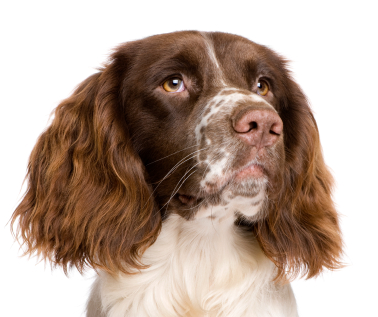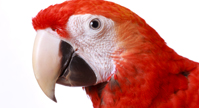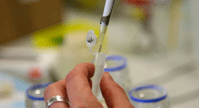Cord1-PRA (PRA)
Description:
Progressive Retinal Atrophy, more commonly known as PRA, is a general term for a group of diseases causing degeneration of the retina, leading to a loss of vision. One form of this disorder is known as cord1-PRA, which stands for cone-rod dystrophy-PRA. Cord1-PRA is a genetic disorder associated with a recessive mutation in the RPGRIP1 gene, which codes for an important photoreceptor protein in the eye. Like many forms of PRA, Cord1-PRA is breed-specific and is known to occur in Miniature Dachshunds and English Springer Spaniels.
Cone-rod dystrophy first affects the cones in the retina, which are the photoreceptors responsible for detecting bright light or daylight. Rods, or low-light photoreceptors, begin degenerating secondarily. This is different than other forms of PRA (such as prcd-PRA) in which the rods are affected first, followed by the cones. Unfortunately, most dogs affected by Cord1-PRA will eventually become blind and there is no cure at this time.
The age of onset can vary with this disorder. Some dogs will first begin experiencing problems at around 6 months in age, though the average age of onset is around 5 years of age. A small percentage of dogs do not experience any symptoms until as late as 10 years of age. It is not yet known why some dogs will experience late-onset PRA, however, it is likely due to the presence of other genetic modifiers that have not been determined at this time.
Because this disorder is recessive, a dog must have two copies of the mutated gene to exhibit symptoms associated with PRA. A dog can be a carrier of Cord1-PRA (meaning it only has one copy of the mutation) and not show any outward signs of retinal degeneration. A carrier can still pass on the mutated gene to any offspring; mating two carrier dogs can produce offspring affected by Cord1-PRA about 25% of the time.
Sample Type:
Animal Genetics accepts buccal swab, blood, and dewclaw samples for testing. Sample collection kits are available and can be ordered at test now.
Test Is Relevant to the Following Breeds:
Miniature Long-Haired Dachshund, Miniature Wire-Haired Dachshund, Minature Smooth-Haired Dachshund, English Springer Spaniel
Results:
Animal Genetics offers DNA testing for cord1-PRA. The genetic test verifies the presence of the recessive mutation and presents results as one of the following:
| PRA/PRA | Affected | The dog carries two copies of the mutant gene and is homozygous for the cord1-PRA mutation. The dog will display symptoms associated with the disorder and will always pass a copy of the mutation to its offspring. |
| PRA/n | Carrier | Both the normal and mutant copies of the gene detected. The dog is a carrier for cord1-PRA and could pass on either allele to any offspring 50% of the time. |
| n/n | Clear | Dog tested negative for the cord1-PRA mutation and will not pass on the defective gene to its offspring. |
Submit a Sample for Testing:
To submit a sample for testing please go to test now.
To order a sample collection kit please go to order sample collection kits.
Cost per sample is $45.00. Please see our Canine Fee Schedule for all test rates.










